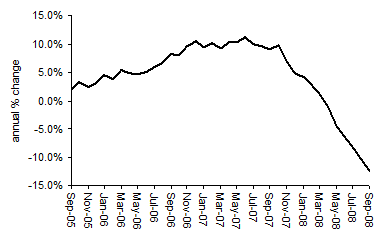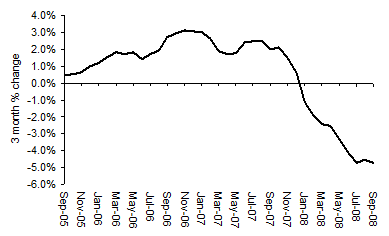House prices in the Fall
- The price of a typical house fell by 1.7% in September
- Market weakness not surprising given ongoing turmoil and many risks remain
- House prices will continue to fall in short term, but longer term prospects are more sound
Headlines |
September 2008 |
August 2008 |
Monthly index * Q1 '93 = 100 |
323.9 |
329.3 |
Monthly change* |
-1.7% |
-1.7% |
Annual change |
-12.4% |
-10.5% |
Average price |
£161,797 |
£164,654 |
* seasonally adjusted
Commenting on the figures Fionnuala Earley, Nationwide's Chief Economist, said:
“House prices fell by 1.7% in September. This brings the price of a typical house in the UK to £161,797, 12.4% less than at this time last year . House prices have now fallen for eleven consecutive months, but the monthly rate of fall has been almost unchanged in the last three months. The less volatile three-month-on-three month series has also barely changed for the last three months, after accelerating in the first half of the year. This may suggest the beginning of some stabilisation in the pace of house price falls.
One year on from the credit crunch things look very different
“Casting back one year there have been some astonishing and unpredictable developments in the housing and financial markets. In September 2007 the credit crunch had just begun, house prices were rising at an annual rate of 9.0%, the number of house purchase approvals per month was averaging at around its long term trend, almost 40% of first-time buyers were borrowing over 90% and the Bank Rate was at 5.75%, but with many expecting it to increase to 6%. The situation in September 2008 could hardly be more different. House prices are falling, activity has contracted sharply, fewer than 20% of first-time buyers are borrowing above 90%, and the Bank Rate has fallen to 5% and is expected to fall to 3.5% by the end of 2009.
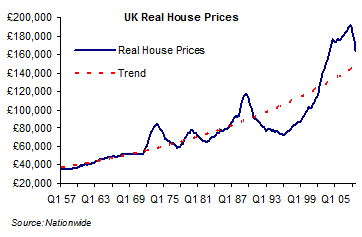 “It’s clear that market conditions can change very quickly but this is not so unusual. Nationwide has been measuring house prices since the 1950s. During that time there have been several cycles of rapid acceleration and rapid cooling of house price growth. One benefit of having such a long running data series is that we can clearly see that price movements at any particular point in time do not tend to say much about the long run trend. And, price movements from the peak to a trough of a cycle simply show the extent of the volatility in prices around the trend rather than anything more meaningful about their future path. The long-run trend growth in real house prices in the UK is around 2.7% per annum and there is no reason to expect that over the longer term house prices should not continue to go up in real terms, even if we are going through a sharp correction now.
“It’s clear that market conditions can change very quickly but this is not so unusual. Nationwide has been measuring house prices since the 1950s. During that time there have been several cycles of rapid acceleration and rapid cooling of house price growth. One benefit of having such a long running data series is that we can clearly see that price movements at any particular point in time do not tend to say much about the long run trend. And, price movements from the peak to a trough of a cycle simply show the extent of the volatility in prices around the trend rather than anything more meaningful about their future path. The long-run trend growth in real house prices in the UK is around 2.7% per annum and there is no reason to expect that over the longer term house prices should not continue to go up in real terms, even if we are going through a sharp correction now.
“The higher cost and lower availability of finance resulting from the credit crunch were clearly important factors in triggering the slowdown and bringing us to where we are now. Current unrest threatens to increase funding costs further, but the big question is how far will prices correct and how long before they begin to recover.
But where will things go next?
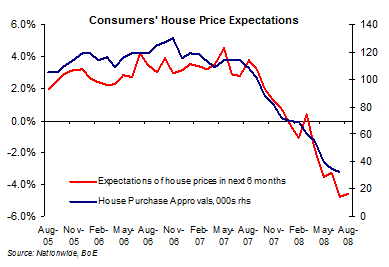
“A large part of this will depend on sentiment. While it’s a fuzzy concept, it does have a big effect on prices and activity. Consumers’ views about house price growth changed almost immediately after the problems at Northern Rock. Once sentiment began to shift, it’s hardly surprising that this led borrowers’ behaviour to change significantly. There seems to be a close relationship between consumers’ expectations of house price growth and the number of house purchase approvals. As expectations have collapsed, house purchase approvals have fallen to less than a third of their long run trend. It seems that we would need to see a significant shift in consumers’ sentiment before we begin to see any real recovery in activity and subsequently house prices.
“Sentiment is important, but macroeconomic fundamentals and a resolution to current financial market turmoil are key in taking a view about where house prices will go. With the economy now beginning to contract and expected to remain at sub trend growth into 2010 there is little to suggest that the market will turn around quickly.
Rumsfeld Risks
“However there is still a great deal of uncertainty because conditions are changing so rapidly. Donald Rumsfeld’s famous known knowns, known unknowns and unknown unknowns could easily be applied to the housing market right now with several factors in each category. We know that income growth is weaker and unemployment will go up as the economy slows. Yet we don’t know how the housing market will respond to the expected reduction in interest rates, neither do we know how the buy-to-let market may behave in this cycle, nor how long before the lack of housing supply again becomes a support to prices. Furthermore, a resolution to the latest financial market turmoil has yet to be found. As for the unknown unknowns, no one would have thought that the world’s major investment banks would get into such difficulty and with increasing wobbles at home and abroad there could be good or bad news on the horizon.
“House prices now are over 60% higher in real terms than they were at the start of the decade, even taking into account the falls since last October. Even if prices fall over the next couple of years, at the trough that would still leave prices more than a fifth higher in real terms than at the start of the decade. Although price falls are not painless, they do contribute to restoring housing affordability to more sustainable levels, which is positive for the market over the long term. Although the next year or two will be difficult, over time the global economy will recover from current difficulties, helping to end the cyclical downturn in property markets.”
Fionnuala Earley Roy Beale
Chief Economist Media Relations Officer
Tel: 01793 656370 Tel: 01793 655689 fionnuala.earley@nationwide.co.uk roy.beale@nationwide.co.uk
Long Term Real House Price Trend
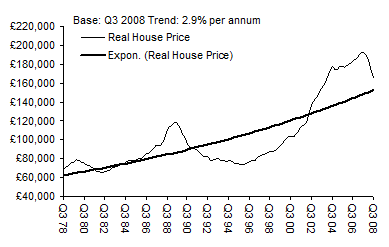
Average UK House Price
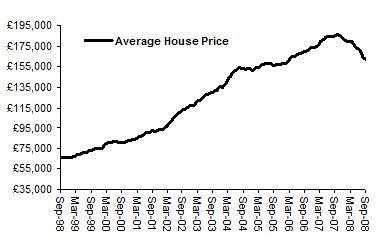
Annual % Change in House Prices
3 Months on Previous 3 Months % Change
Historical Data
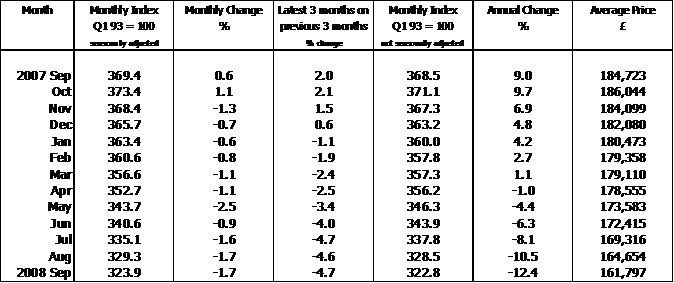
Notes:
Indices and average prices are produced using Nationwide's updated mix adjusted House Price Methodology which was introduced with effect from the first quarter of 1995. Price indices are seasonally adjusted using the US Bureau of the Census X12 method. Currently the calculations are based on a monthly data series starting from January 1991. Figures are recalculated each month which may result in revisions to historical data.
The Nationwide Monthly House Price Index is prepared from information which we believe is collated with care, but no representation is made as to its accuracy or completeness. We reserve the right to vary our methodology and to edit or discontinue the whole or any part of the Index at any time, for regulatory or other reasons. Persons seeking to place reliance on the Index for their own or third party commercial purposes do so entirely at their own risk. All changes are nominal and do not allow for inflation.
More information on the house price index methodology along with time series data and archives of housing research can be found at www.nationwide.co.uk/hpi
Photographs of our economists are available at: www.nationwide.co.uk/mediacentre/economist.asp
Think carefully before securing other debts against your home, your home may be repossessed if you do not keep up repayments on your mortgage.
Go Direct.co.uk is a trading style for website purposes of Go Direct UK Ltd.
Go Financial Services is a trading style of Go Direct UK Ltd which is an appointed representative of Personal Touch Financial Services Ltd which is authorised and regulated by the Financial Conduct Authority. Registered in England & Wales Company 5703224. FCA Number 456600
We normally do not charge a fee for mortgage advice, however this is dependent on your circumstances. Our typical fee would be £349





